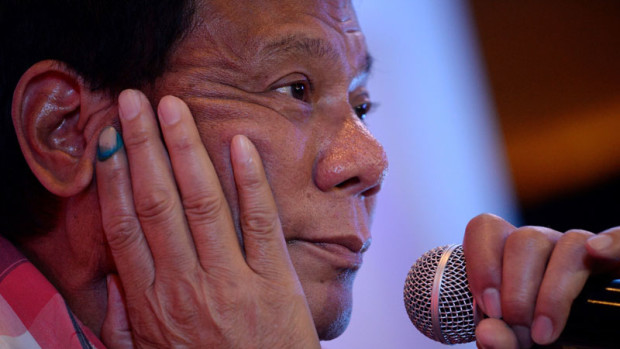
Presidential frontrunner and Davao City Mayor Rodrigo Duterte attends a press conference after he cast his vote in Davao City, on the southern island of Mindanao on May 9, 2016. AFP FILE PHOTO / NOEL CELIS
DAVAO CITY—He has been called many names: Du30, Dirty Harry, DoDirty, The Punisher, Digong, and possibly PGong, to go by the media’s headline-making shortcuts.
But presumptive President Rodrigo Duterte prefers to be called “President Rody,” according to his close friend and national campaign manager, Leoncio Evasco.
It was how his mother used to call him, Evasco said, referring to former school teacher Soledad Duterte, or Nanay Soleng, who was at the forefront of the Yellow Friday Movement against the Marcos dictatorship in the 1980s.
In fact, it was Nanay Soleng whom then President Corazon Aquino had asked to sit as vice mayor and officer in charge of Davao province following the ouster of President Ferdinand Marcos in 1986, but she declined.
Supporters then pushed her son to take the post instead, which he did in 1987.
The following year, Duterte ran for mayor and won, earning a reputation as The Punisher for his tough stance on crime in Davao for the next 22 years.
‘Paksiw na isda’
After tempering the tough-guy image of the presumptive President with a picture of him weeping at his parents’ grave the day after elections, Duterte’s lieutenants said he went home, slept and craved paksiw na isda (fish stewed in vinegar) upon waking up.
But Duterte’s aides cannot—or would not—say where their boss was three days after Monday’s elections. His household looked deserted and he was nowhere to be found, they said, adding that he would meet well-wishers next Monday.
The former city prosecutor and Davao City mayor will be the Philippines’ 16th President, and the first to come from Mindanao.
The 71-year-old Duterte was born in Maasin, Leyte province, before his family migrated to Davao. In his campaign rallies, he would often talk about his being a settler in Mindanao to compare the story of Mindanao to that of the rest of the country.
Federalism
His blistering five-month electoral campaign also harped on the flaws of a centralized government, where power and resources have always resided in Metro Manila, which, he said, “has been riddled with allegations of corruption,” while the rest of the country fought for crumbs. Duterte has been very vocal about his support for federalism.
His critics have often cited his inappropriate jokes and undiplomatic blunders during his campaign, but Duterte’s wayward personality since his younger days has formed part of his legend.
Although expelled thrice from high school, Duterte managed to finish secondary education at Holy Cross Academy of Digos. He took up political science at Lyceum of the Philippines University and studied law at San Beda College where he graduated in 1972, the year that former President Marcos declared martial law.
The son of Vicente Duterte, the former governor of the undivided Davao province, loves to regale crowds with tales of his youthful misadventures—from target shooting in Guihing, Davao del Sur, to landing a piper plane in the middle of a public market somewhere in Cotabato province.
Dirty Harry
He later turned the derring-do to a formidable reputation as Davao’s Dirty Harry, turning Davao from being the former killing fields of communist death squads during martial law, to one of the world’s safest places.
But detractors said the mayor also used the same iron fist to approve summary killings, allegedly by the Davao Death Squad, of suspected drug pushers and criminals in the city.
In numerous speeches, Duterte loved to talk about how, at Lyceum, he was a student of Jose Maria Sison, the founder of the Communist Party of the Philippines (CPP), who is currently exiled in The Netherlands.
Sison was recently quoted as saying he would come home if the presumptive President visits him at Utrecht.
Duterte also describes himself as being leftist because of his class background.
Despite his hard stance against criminals, Duterte had remained on friendly terms with the Left, and had once warned against the killing of political activists in his city. He has also maintained close ties with the police and military, recently rescuing some of those held hostage by the communist New People’s Army (NPA).
Substitution
After being elected Davao mayor for three consecutive terms from 1988 to 1998, Duterte ran for a congressional seat and won.
From 2001 to 2010, he made a comeback as mayor, and later ran as vice mayor to his daughter Sara until 2013, when he again ran for mayor.
Last year, when people expected him to file his certificate of candidacy for President, Duterte instead filed for reelection as city mayor. A month later, he changed his mind and decided to seek the presidency by substitution under the Partido Demokratikong Pilipino-Lakas ng Bayan (PDP-Laban) slate.